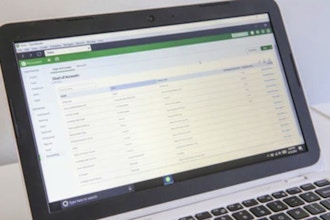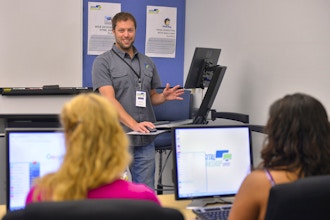Discover the Best Live Online QuickBooks Classes
QuickBooks is the most popular small-business accounting software in the world. With an 80% market share in 2022, QuickBooks manages the finances of some 26 million companies between its two versions, QuickBooks Pro (the stand-alone desktop model) and Quickbooks Online (the cloud-based edition.) Of the two, the cloud version is generally accepted to be the more user-friendly, although you’re still going to have to have a grasp of basic accounting principles if you’re to make head or tail of the software. The more difficult-to-learn desktop version (which Intuit makes somewhat complicated to purchase) is, however, more powerful, especially with regard to the number of reports it can generate. Entrepreneurs seeking accounting software for a new business should consider both QuickBooks Pro and QuickBooks Online, weigh the differences between the two, and decide carefully which is better suited to their burgeoning enterprise.
An oddity is that neither version of QuickBooks is offered by Intuit for sale. The software is available only through a number of tiered subscription plans, which make QuickBooks anything but cheap. The most popular online plan starts at more than $80 a month, with substantial additional fees levied for such things as payroll and the built-in services of a human accountant. Although Intuit gives the impression that all you need is QuickBooks and even tax time will make sense, the more circumspect reality is that a business also needs a live accountant, if only to oversee the QuickBooks books. That obviously is going to add more to your accounting budget, but it can avoid costly mistakes in the long run.
The first reason for learning QuickBooks is, therefore, if you own a small business, you’re going to need some kind of accounting software, and QuickBooks didn’t become the market leader by such a huge margin because it doesn’t work. It’s software you can trust if you want to know how much money you’ve got, how much you need for payroll, and how much you’re going to owe the government in taxes. With luck, your company will thrive and prosper, and you’ll need more than just yourself and QuickBooks to manage the finances: you’ll need a bookkeeper, or at least someone who can wear multiple hats, one of which would be a bookkeeper’s green visor.
That creates a second group of people who’d do well to learn QuickBooks. Without needing a four-year degree in accounting, you can make yourself a hireable bookkeeper by knowing how to use the software. A bookkeeper’s job in a small business is to do pretty much what an accountant does: monitor how much money is going out and how much is coming in, handle payroll and keep track of tax due and deductible expenses. True, they do it for less money than an accountant would make, but bookkeeper is a good, steady position that is vital to a small business as it grows. Learning QuickBooks can be the first step towards landing such a position.
A bookkeeper doesn’t exactly replace an accountant. A business still needs one of the latter to oversee its bookkeeper’s efforts, and accountants with a lot of small companies on their client lists also most likely have a lot of clients who use QuickBooks. As a result, although accountants don’t need QuickBooks to do their jobs, they do need to know how to use the software if they’re to be able to lend their monthly or quarterly helping hands to businesses that do. There is even a special edition of QuickBooks Pro designed for accountants who use the software in precisely this capacity. Knowing how to use it is thus part and parcel of the small business accountant’s job.
Best Live Online QuickBooks Classes & Schools
A broad selection of online QuickBooks classes is available to students looking to learn the software from their own homes or offices, beginning with the beginning-level QuickBooks Online for Beginners, which, as the name is ambiguous, is an online class in QuickBooks Online. Offered by the Digital Workshop Center in Fort Collins, Colorado, the course is spread across three weekday afternoons and covers everything you’d need to know to operate QuickBooks effectively. Students are given a sample company file to work with, simulating real-life numbers without having them run the risk of confusing their actual company’s records.
For those looking for a more advanced class, the Digital Workshop Center also offers a course in Payroll Fundamentals that teaches further bookkeeping skills. Although the class begins with the basics of managing payroll, it goes on to cover more involved payroll scenarios so that students are ready, if not for everything, when they land a bookkeeping job, at least ready for most foreseeable scenarios. This course also meets for three weekday afternoon sessions.
Chicago-based Computer Training Source offers its QuickBooks classes in the desktop version of the software. QuickBooks Desktop Part I and its follow-up QuickBooks Desktop Part II help students crack the tougher nut that is QuickBooks Pro. All the main topics are covered, including payments, inventory, working with bank accounts, billing, reports, graphs, reporting sales tax, and even payroll. By the end of the second course, you’ll be able to function productively in the QuickBooks universe. The classes run for two three-hour evening sessions each. There is even a QuickBooks Desktop Part III on offer, which has students working hands-on with mock company data and performing all the operations they would if they were employed and using the software with real numbers.
Computer Training Source can also help you out with an online QuickBooks Online class: QuickBooks Online Part I. Meeting for one full weekday, the course goes through most of the essential operations of QuickBooks, with the notable exception of payroll. Like all classes from Computer Training Source, classes are kept intentionally small (no more than ten participants) to ensure that each student receives sufficient attention from the teacher. A follow-up QuickBooks Online Part II is available as well.
Industries That Use QuickBooks
As 80% of all small businesses that use accounting software use QuickBooks, you can infer that the software is used in just about every industry there is. You can even use the desktop version to run a medical business. The question, therefore, isn’t which industries use QuickBooks but, rather, what types of companies employ the software. These are primarily small to medium businesses with ten to 50 employees, just the size to require a bookkeeper on staff, which makes for quite a few QuickBooks jobs to be had out there.
QuickBooks Enterprise, the edition of the desktop version of the software designed for more medium-sized organizations, comes in several specific flavors, each created with the requirements of a particular industry in mind. Thus companies that are engaged in manufacturing and wholesale, contracting, retail, professional services, and not-for-profit activities are much more likely to be running QuickBooks. Knowing your way around these industry-specific releases of the software can only help you find a position as a QuickBooks bookkeeper.
QuickBooks Jobs & Salaries
QuickBooks users are, first and foremost, people who own smaller businesses and need to track expenses, receivables, sales tax, and payroll. You can imagine that entrepreneurs whose businesses are in their infancy will take care of their own books for as long as they can. As a business grows, so do its bookkeeping needs, and you rather hope that your business is going to expand far enough to warrant bringing in a bookkeeper, maybe part-time at first and then full-time.
From this comes a second type of QuickBooks user: the bookkeeper. Whereas accountants generally have bachelor’s degrees (and often have schooling beyond that, especially if they’re Certified Public Accountants), bookkeepers are cut from a slightly humbler cloth and, more frequently than not, have only some college accounting courses under their belts. They still need to know how to operate bookkeeping software, which, far more often than not, means QuickBooks if you’re looking for a job in a smaller company.
The Bureau of Labor Statistics reported in 2022 that bookkeepers (“bookkeeping, accounting, and auditing clerks” is their official term for these professionals) earn a median annual salary of approximately $45,500. As a rule, larger salaries are to be found in localities with a higher cost of living: in the New York Metropolitan Area, bookkeepers’ annual salaries run to just under $55.000, while in Greater Los Angeles, they earn some $53,000 per year. On the other side of the national median figure, bookkeepers and accounting clerks in Billings are paid slightly less than $42,000 per annum, reflecting the more affordable cost of living in Montana as opposed to in the country’s two preeminent metropolises.
Although, in a sense, QuickBooks does the same thing that accountants do (only accountants do it for more money), having one doesn’t really obviate the need for the other. Although accountants with four-year degrees, therefore, don’t need QuickBooks, they do need to know how to operate the software because they are likely to be brought in to lend a hand to the financial record-keeping of companies that employ QuickBooks for their day-to-day bookkeeping needs. Given their greater qualifications, accountants make more than bookkeepers, to wit, a national median salary of approximately $77,000, again according to 2022 BLS numbers. Once more (and as expected), the salaries on the upper side of the median figure are to be found in larger cities where life is more expensive: thus, an average salary of approximately per annum $114,000 in the New York Metropolitan Area and $92,500 in Greater Los Angeles. Over on the other half of the spectrum is a small city like Montgomery, AL, with its 200,000 inhabitants, where accountants can look forward to an annual salary of roughly $72,000.

























